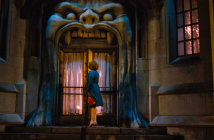Nashville (1975)
Cast: Keith Carradine, Karen Black, Ronee Blakley
Director: Robert Altman
Country: USA
Genre: Drama | Music
Official Site: Here
Editor’s Notes: The following review is part of our coverage for TIFF’s Company Man: The Best of Robert Altman. For more information on upcoming TIFF film series visit http://tiff.net and follow TIFF on Twitter at @TIFF_NET.
Following a string of career-defining films, such as M.A.S.H. (1970), McCabe and Mrs. Miller (1971), and The Long Goodbye (1973), Altman set his sights on the country music capital of the world. Nashville is just as iconic, if not more so, as any other Altman film because it accomplishes so much with such grace and finesse. It is an experimentation in the musical genre that blends a wandering narrative, a brilliant ensemble cast, and confrontational politics into a re-evaluation of the “American dream.”
Nashville is just as iconic, if not more so, as any other Altman film because it accomplishes so much with such grace and finesse.
The film chronicles five days in the titular town, where the politics of presidential candidate Hal Phillip Walker can be heard blaring over a bullhorn. Various characters weave in and out of the narrative fabric, until their dreams and aspirations clash at the Parthenon. Amongst the characters are Barbara Jean (Ronee Blakely), an emotionally unstable country singer who is recuperating from a flaming baton accident, Opal (Geraldine Chaplin), a British woman who harasses celebrities by claiming she is making a documentary for the BBC, Linnea Reese (Lily Tomlin), a passionate choir member who has two deaf children, Tom Frank (Keith Carradine), the womanizing member of a folk trio who sets his eyes of Linnea, and Winifred (Barbara Harris), an aspiring country singer who is constantly hiding from her overbearing husband. The film seamlessly recounts all these stories, which clash against one another as frequently as the cars crash on the freeway.
Nashville is a self-aware film that wears its satirical elements openly on its sleeves. Altman has no qualms about exploring these visions of America at the expense of ridiculing the conservative values/politics of the characters and setting.
Nashville famously ends with a concert at the Parthenon, where (Warning – Spoilers) the Howdy-Doody-looking Kenny Frasier (David Hayward) shoots Barbara Jean. Altman’s unique style not only brings his liberal politics to the forefront (the character of Haven Hamilton screams out “This isn’t Dallas, it’s Nashville! They can’t do this to us here in Nashville! Let’s show them what we’re made of.”), but it also challenges the audiences’ expectations by turning the target into a harmless female country singer. As Barbara Jean’s bloody body is hauled off the screen, the “Hal Phillip Walker – Replacement Party President” banner waves against a giant American flag. The characters aimlessly wander amongst the confused crowd, with each person getting closer (in one way or another) to accomplishing his/her goal. Amongst them is Winifred who finally gets the opportunity to prove her talents by belting out a rendition of “It Don’t Worry Me.” The catchy tune about perseverance in the face of capitalist crises reveals one of the film’s many messages: in spite of the bloody atrocities that befell Barbara Jean, these characters continue holding onto the delusion idea that the “American Dream” still exists.
Nashville is a self-aware film that wears its satirical elements openly on its sleeves. Altman has no qualms about exploring these visions of America at the expense of ridiculing the conservative values/politics of the characters and setting. Many people from Nashville (most notably, Country singers) derided the film for making fun of them, yet I would argue their interpretation turns Altman’s metaphorical elements into an attack on a specific group of people. Though Altman represents these characters with humor and derision, he uses them as metaphors for something bigger than themselves. It is a brilliant depiction of a whitewashed America that isn’t prepared to face contemporary politics, corruption, or even their own flaws. The film reveals that these characters exist in their own bubbles, hoping that they can avoid facing an uncaring world and continue clinging onto their own ambitions (however delusional they may be).
Nashville brilliantly uses its character filled landscape to explore a vision of a contemporary America that is endlessly searching for its own slice of an outdated dream.




